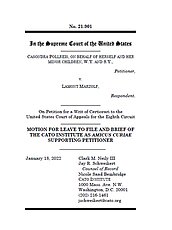Learn more about Cato’s Amicus Briefs Program.
Weston and Haden, aged 12 and 14, were walking home from dinner at their grandparents’ house when they were approached by Officer Marzolf. Marzolf ordered the boys to stop and to lie face down on the ground. He pointed his gun at them and searched them. Though the boys were completely cooperative throughout the encounter, Marzolf also placed them in handcuffs.
The boys’ mother, stepfather, and grandparents all tried to intervene. They each explained who the boys were, where they had been, and where they were going. Marzolf disregarded this information and proceeded to use force against Weston and Haden.
Casondra Pollreis, the boys’ mother, sued Officer Marzolf, arguing his actions amounted to an unconstitutional arrest and an excessive use of force. The District Court found for Ms. Pollreis. On appeal, the Eighth Circuit reversed in Marzolf’s favor, holding the stop never amounted to an unlawful arrest and that the handcuffs and gun were necessary to protect the officer’s safety.
The Fourth Amendment guarantees the right to be free from unreasonable searches and seizures and requires officers to secure warrants before they seize a suspect. The Supreme Court laid out a narrow exception to this rule in Terry v. Ohio, which held that police may make an investigatory stop – one which is substantially less intrusive than a full-blown arrest — if they have reasonable suspicion that a suspect engaged in criminal activity.
Yet in its decision below, the Eighth Circuit held that an officer may continue to search and exert arrest-like force on suspects after reasonable suspicion has dissipated entirely. Officer Marzolf had been looking for two fleeing male suspects in their twenties. By the time Officer Marzolf handcuffed the two boys, they had been lying on their stomachs for minutes, had already complied with all his commands, and had already been identified by their parents and grandparents. Enough time transpired since the initial stop for Marzolf to notice the boys did not match the description of the suspects he was looking for. This is a far cry from the investigatory stop based on “specific and articulable facts” in Terry.
In our new brief, Cato asks the Supreme Court to take up Pollreis’s case to reestablish that Terry’s exception to the warrant requirement is meant to be narrowly applied. Terry’s individualized reasonable suspicion requirement prevents police from stopping individuals based merely upon whims or prejudices, a critical judicial bulwark against the unreasonable searches and seizures the Fourth Amendment proscribes. Without this requirement, law enforcement would wield virtually unlimited discretion to stop, search, and use force against citizens.
In the past 50 years, lower courts have approved increasingly severe and invasive treatment based on reasonable suspicion alone. The Eighth Circuit’s decision continues this troubling tendency of the courts to allow Fourth Amendment exceptions to swallow the rule.
Excessive deference to law enforcement also undermines public trust in the police. In May 2020, Gallup reported that trust in police officers had reached a twenty-seven-year low. This drop in confidence has been driven in part by videos of high-profile police killings of unarmed suspects, and by the public perception that officers who commit such misconduct are rarely held accountable for their actions. Law-enforcement officers, in turn, report serious concerns about their ability to discharge their duties safely and effectively without the confidence of the public.
By establishing that police may handcuff children at gunpoint without reasonable suspicion or probable cause, the Eighth Circuit obviates the Fourth Amendment entirely. Not only does this undermine our protections against the police, it also fuels a crisis of confidence that undermines their ability to protect the public.

This work is licensed under a Creative Commons Attribution-NonCommercial-ShareAlike 4.0 International License.



